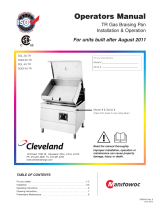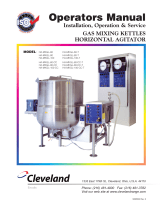
GAS
ENSURE THE GAS SUPPLY MATCHES THE KETTLE'S
REQUIREMENTS AS STATED ON THE RATING PLATE.
Installation must conform, with local codes or in the absence
of local codes, with the National Fuel Gas Code ANSI
Z223.1/NFPA 54, or the Natural Gas and Propane Installation
Code, CSA B149.1.
The appliance and its individual shut-off valve must be
disconnected from the gas supply piping system during any
pressure testing of that system at test pressures in excess of
1/2 psi (3.45 kPa).
The appliance must be isolated from the gas supply piping
system by closing its individual manual shut-off valve during
any pressure testing of the gas supply piping system at test
pressures equal to or less than 1/2 psi (3.45 kPa).
It is recommended that a sediment trap (drip leg) be installed
in the gas supply line. If the gas pressure exceeds 1/2 psi
(3.45 kPa) water column, a pressure regulator must be
installed, to provide a maximum of 1/2 psi (3.45 kPa) water
column gas pressure to the gas control valve.
Use a gas pipe joint compound which is resistant to L.P. gas.
Test all pipe joints for leaks.
1. Removed supplied manual shut-off valve and establish
mounting location.
2. Add union and
piping as required.
3. Connect the gas
line to the manual
shut-off valve.
ELECTRICAL
ENSURE THE ELECTRICAL SUPPLY MATCHES THE
KETTLE'S REQUIREMENTS AS STATED ON THE RATING
LABEL.
A cord and plug are supplied with the unit. Simply plug the
unit into any grounded outlet rated for a minimum of 10 amps.
The kettle must be electrically installed and grounded in
accordance with local codes, or in the absence of local
codes, with National Electrical Code, ANSI/NFPA 70 (USA) or
the Canadian Electrical Code, CSA C22.2, (Canada).
Standard supply voltage is 115 volts A.C., however, optional
A.C. voltages can be supplied on special order. A separate
fused disconnect switch must be supplied and installed in the
high voltage electrical supply line.
The wiring diagram is located under the cover of electrical
box inside the back console.
NOTE: Units are tested on a in-house ground fault system.
However, there is no guarantee the unit will work on all
ground fault systems. If you are having problems you can
hard wire the unit.
WATER
The sealed jacket of the gas-fired kettle is precharged with
the correct amount of a water-based formula, and therefore,
no water connection is required to the kettle jacket. The kettle
can be equipped with optional hot and cold water taps,
requiring 1/2" copper tubing as supply lines.
CLEANING
After installation the kettle must be thoroughly cleaned and
sanitized prior to cooking.
INSTALLATION CHECKS
Although the kettle has been thoroughly tested before leaving
the factory, the installer is responsible for ensuring the proper
operation of kettle once installed.
1. Before turning the kettle on, read the vacuum/pressure
gauge. The gauge's needle should be in the green zone.
If the needle is in the "VENT AIR" zone, follow air venting
procedure.
2. Unit has been thoroughly checked for gas leaks at the
factory however the installer should check all connections
for any leaks which may have resulted from shipping or
installation.
3. Supply power to the kettle by placing the fused
disconnect switch to the "ON" position.
4. Open gas shut-off valve to turn on main gas supply.
5. Turn the temperature control knob to "1" (Min.). The green
LED light should remain lit, indicating the burner is lit, until
the set temperature is reached. Then the green light will
cycle on and off, indicating the burner is cycling on and off
to maintain temperature.
6. Tilt the kettle forward. After a few seconds the red "LOW
WATER" light should be lit when the kettle is in a tilted
position. This light indicates that the burner has
automatically been shut off by the kettle's safety circuit.
This is a normal condition when the kettle is in a tilted
position.
7. Raise the kettle to the upright position. The red "LOW
WATER" light should go out when the kettle is upright.
8. Turn the temperature control knob to "10"(Max.) and allow
the kettle to preheat. The green light should remain on
until the set temperature is reached. Then the green light
will cycle ON and OFF, indicating the burner is cycling
ON and OFF to maintain temperature.
9. Check carbon monoxide is less than 0.08 percent in an
air-free sample of the flue gases. See FREE AIR
CALCULATION procedure in “Maintenance Procedures &
Parts Lists” manual.
BACK OF KETTLE
UNION
NIPPLE
SHUT-OFF
VALVE
GAS
S
UPPLY
WARNING: Electrical Grounding Instructions.
This unit is equipped with a three-prong (grounding)
plug for your protection against shock hazard and
should be plugged directly into a properly grounded
three-prong receptacle. Do not cut or remove the
grounding prong from this plug.
4.













